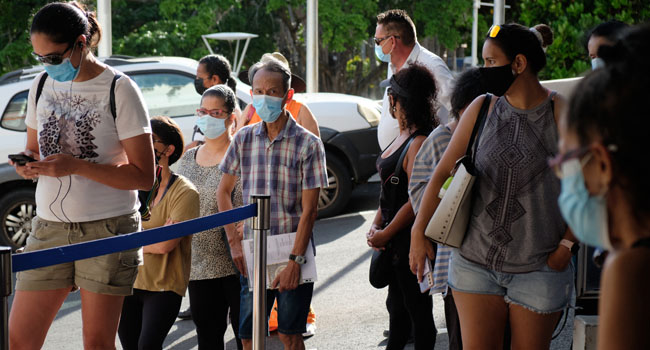
Residents wait to vote for the referendum on independence outside a polling station of the City Hall in Noumea, on the French South Pacific territory of New Caledonia on December 12, 2021. Theo Rouby / AFP
Islanders on the Pacific territory of New Caledonia voted overwhelmingly on Sunday to remain part of France in a third referendum that was boycotted by pro-independence groups, raising fears of new tensions.
With all ballots counted, 96.49 percent were against independence, while only 3.51 percent were in favour, with turnout a mere 43.90 percent, results from the islands’ high commission showed.
“Tonight France is more beautiful because New Caledonia has decided to stay part of it,” President Emmanuel Macron said in a recorded video message that made no direct mention of the boycott.
Police reinforcements have been sent to the resource-rich territory known as “the pebble”, which is of strategic importance to France and part of a wider tussle for influence in the Pacific between Western countries and China.
The boycott and crushing nature of the “No” vote will raise fears of protests as well as questions about the democratic legitimacy of the result on the archipelago, which lies 2,000 kilometres (1,250 miles) east of Australia.
Macron noted “the high abstention rates” but said France could be “proud” of a more than 30-year process designed to settle the islands’ status under which residents were asked in three separate referendums if they wished to break away.
Having rejected independence in 2018 and then again last year, inhabitants were called on Sunday to answer one last time whether they wanted New Caledonia “to accede to full sovereignty and become independent”.
Pro-independence campaigners boycotted the vote, saying they wanted it postponed to September because “a fair campaign” was impossible with high coronavirus infection numbers.
Loyalist Joy

Residents wait to vote for the referendum on independence outside a polling station of the City Hall in Noumea, on the French South Pacific territory of New Caledonia on December 12, 2021. Theo Rouby / AFP
The result could exacerbate long-standing ethnic tensions, with the poorer indigenous Kanak community who generally favour independence staying away from polling booths on Sunday.
The wealthier white community turned out in large numbers.
“We have decided in our souls and consciences to remain French,” Sonia Backes, a senior pro-France figure, told supporters on Sunday evening.
“The sad dreams of an independence at the cost of ruin, of exclusion and misery have crashed on the reef of our pioneering spirit, our resilience and our love for our own land,” she added.
The main indigenous pro-independence movement, the FLNKS, had called the government’s insistence on going ahead with the referendum “a declaration of war”.
Noone from their side commented on the results on Sunday night.
Kanaks had also been called by their traditional community leaders to observe a day’s mourning on Sunday for those killed by the coronavirus.
Around 2,000 police and troops were deployed for the vote, which passed off largely without incident except for an attempted roadblock on an outlying island.
Chinese Influence
At stake in the vote was one of France’s biggest overseas territories which is home to about 10 percent of the world’s reserves of nickel, which is used to make stainless steel, batteries and mobile phones.
The islands are also a key part of France’s claim of being a Pacific power, with New Caledonia granting Paris rights to the surrounding ocean, as well as serving as a military staging post.
Experts suspect that an independent New Caledonia would move closer to Beijing, which has built up close economic links and political influence on other Pacific islands.
“A period of transition is beginning. Free from the binary choice of ‘Yes’ or ‘No’, we must now build a common project, while recognising and respecting the dignity of everyone,” Macron added in his message.
He added that “we will have to build a place for New Caledonia in the Indo-Pacific region which is in flux and subjected to major tensions.”
France has 13 separate overseas territories, home to 2.7 million people, which are generally poorer and have higher unemployment than the European mainland, leading to long-standing accusations of neglect.
Some such as French Polynesia have been granted large degrees of autonomy, which could serve as a model for New Caledonia.
Macron underlined how the three referenda had shown New Caledonia “remained profoundly divided” and spoke of “the necessary reduction in economic inequalities which weakens the unity of the archipelago”.
The pro-independence movement has threatened not to recognise Sunday’s result and vowed to appeal to the United Nations to get it cancelled.
The territory was largely spared during the pandemic’s first phase, but has suffered close to 300 Covid-19 deaths since the Delta variant arrived.
Some observers fear tensions could spark a return of the kind of violence last seen in the 1980s when clashes broke out between the pro-independence Kanaks and the white community.
AFP

